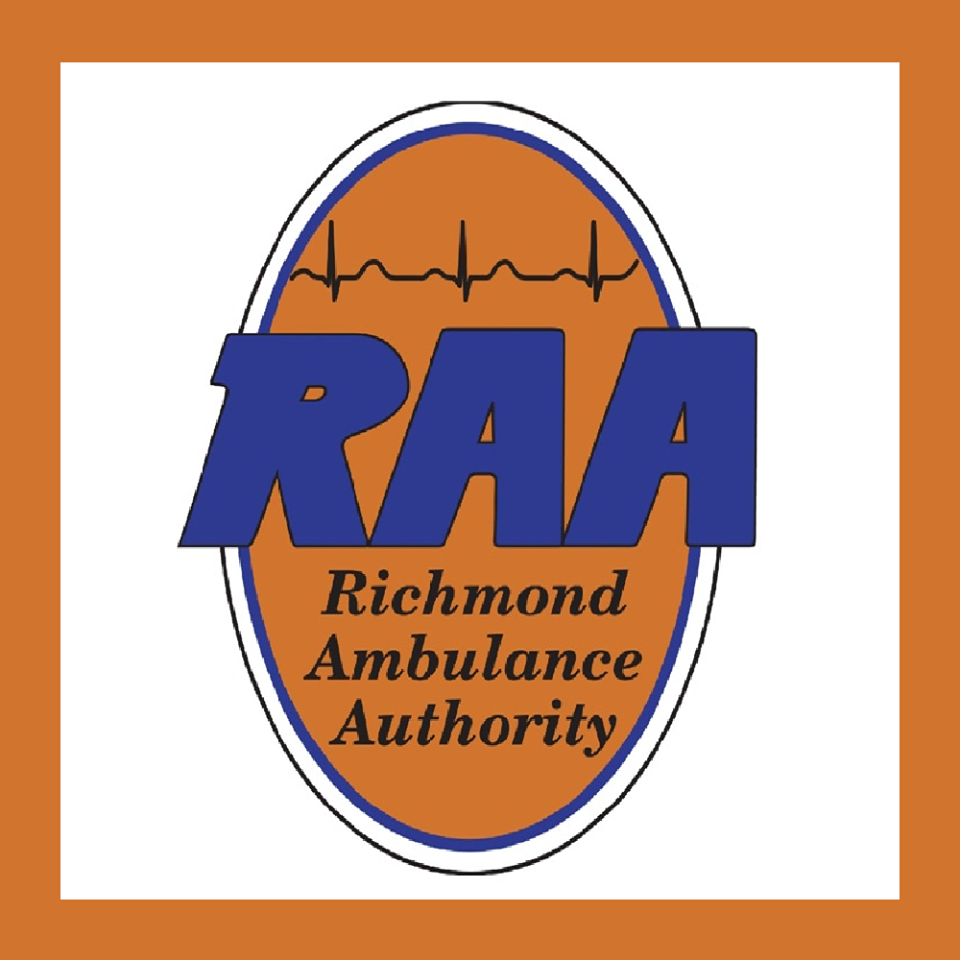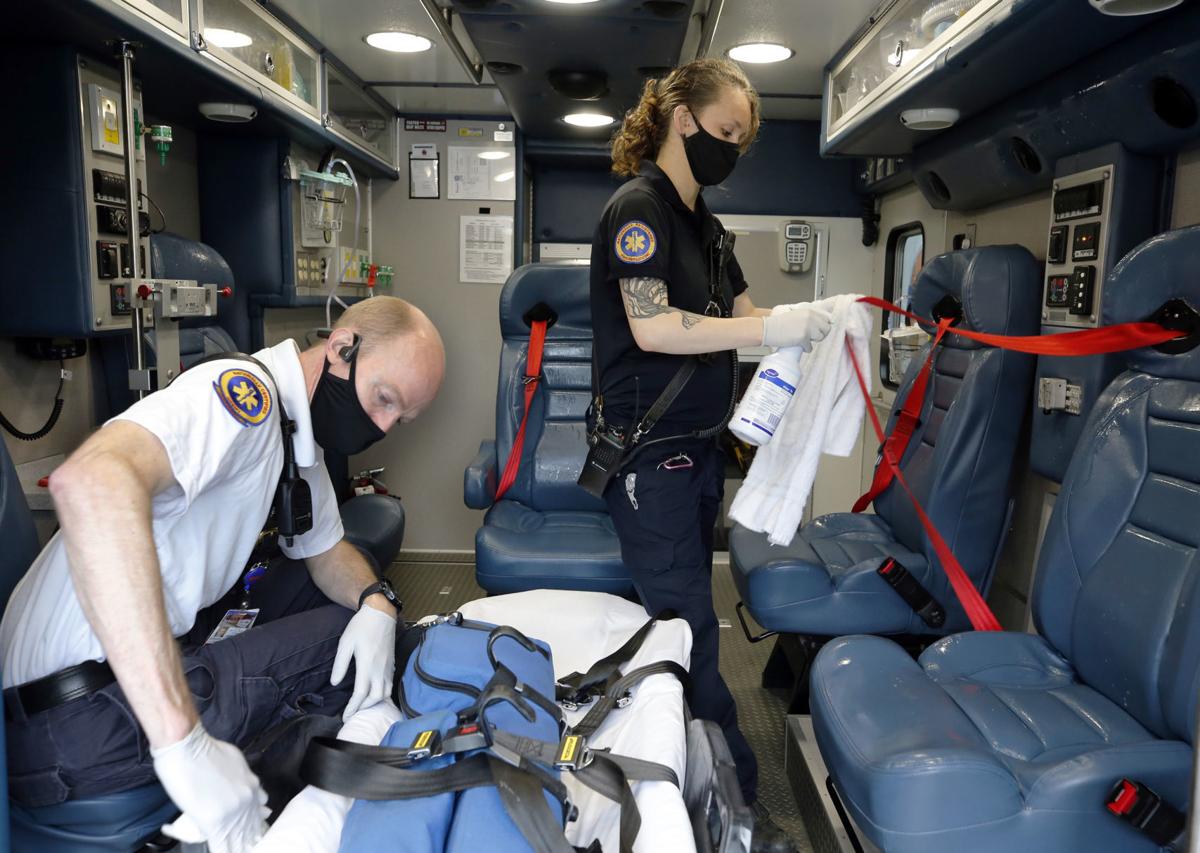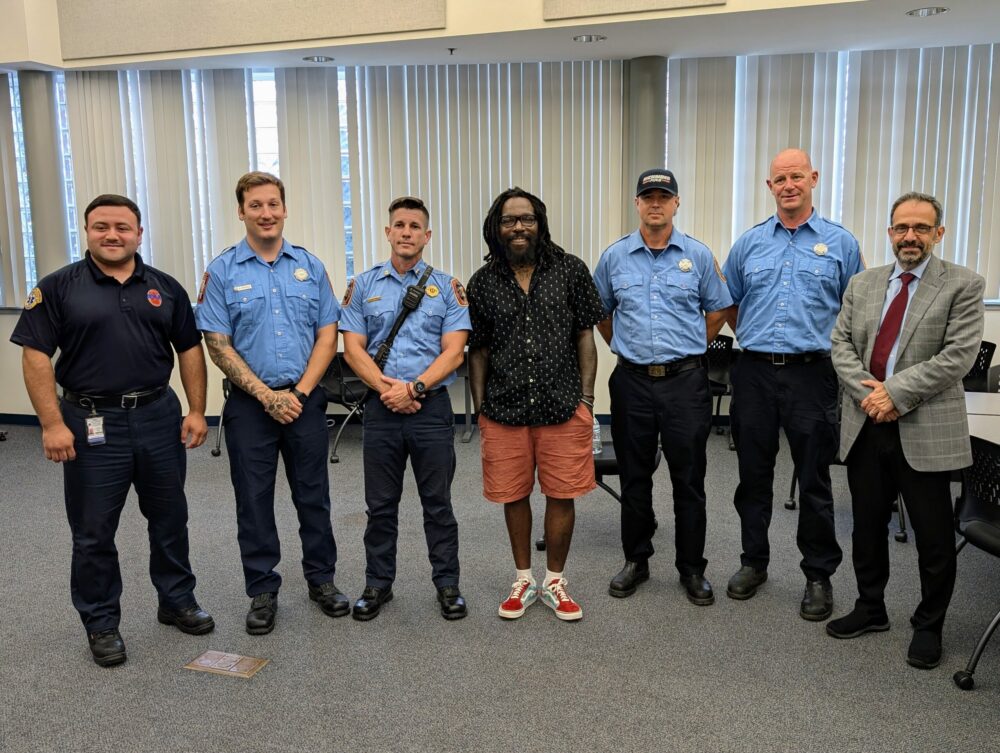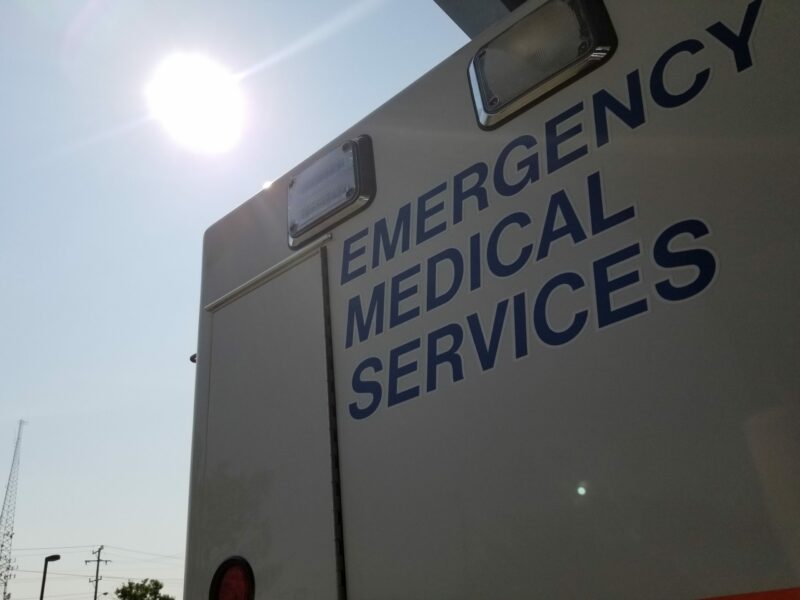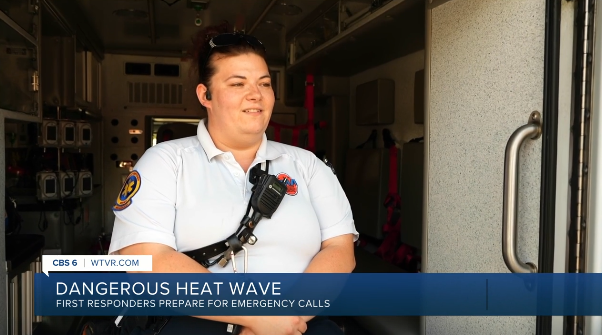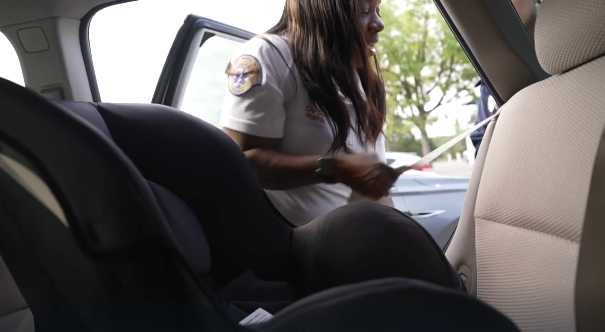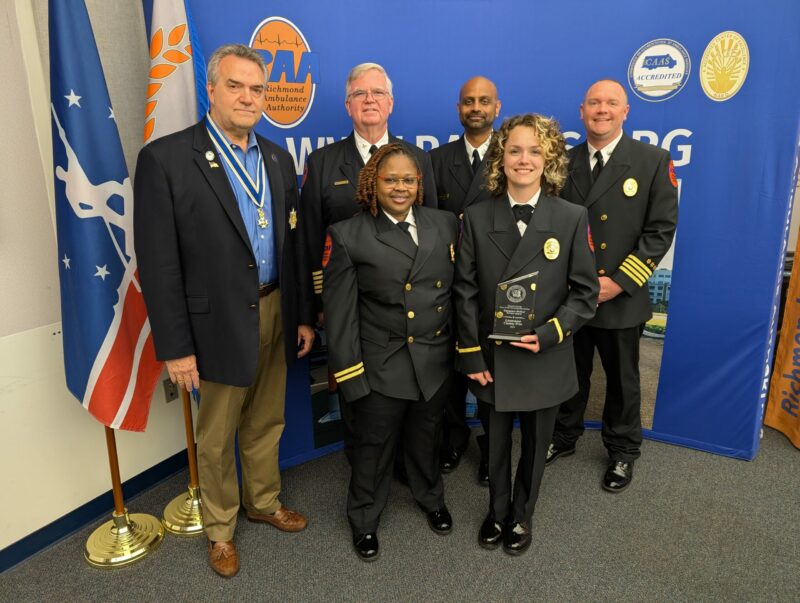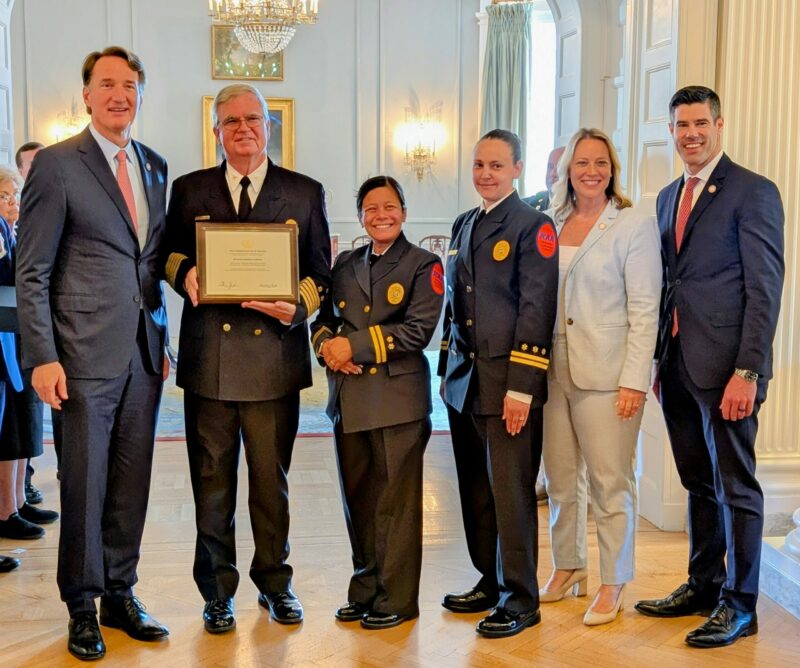This article originally appeared on richmond.com
At a time when routine tasks such as buying groceries and pumping gas elicit anxiety, many of our friends and neighbors are putting themselves in harm’s way.
The threat of contracting COVID-19 looms large over every shift, but they say that’s what their job asks of them. Is it asking too much? They keep showing up.
***
Claire Moore, 34, clinical nurse, VCU Medical Center
Claire Moore works in the Progressive Care Medicine Unit, a 29-bed section typically home to patients with maladies like pneumonia, urinary tract infections, alcohol withdrawal or AIDS related illnesses.
But her unit was tapped to treat coronavirus patients when the number of infections began to rise because each room is equipped with negative pressure, which helps keep pathogens from spreading.
“Like everyone, I was a little bit nervous at first,” she said from her apartment in Church Hill. “But I knew it would be very meaningful to care for patients sick with this.”
The first few weeks were the worst, she said.
“The first two weeks, we had a death every couple of days,” she said. “I can’t even describe it. The loneliness that our patients were feeling, not to be able to have someone with them that they loved, is unspeakable. It’s unbearable what these families are going through.”
One saving grace, Moore said, is that VCU is providing all of the COVID-19 patients on her unit with an iPhone to connect with their families, face-to-face, with FaceTime.
“Many of my patients are older or they don’t have the financial resources to have a phone like that. To be able to connect my patients with their families, it brightens their day and that’s tied to physical health. When you can uplift a patient’s spirits, I think it really helps in their recovery,” she said.
“Every morning, I can FaceTime my patients and say, ‘Hi, I’m Claire. I’ll be your nurse today. What do you need today?” she said.
Moore works 12 ½-hour shifts, three days a week.
Before she goes into each room, she dons a fresh fluid-resistant gown, goggles or a face shield, a mask and gloves, and removes it all when she comes out of the room. She is watched by a monitor to ensure she doesn’t contaminate herself.
The most challenging part, she said, is that she can’t come and go as easily into her patients’ rooms as she used to before the virus. Now, she has to plan and strategize.
“You have to think: Who needs to be fed? Who needs to be toileted? Who is able to order their food themselves? Who needs meds right now?” she said. “The hardest thing is that I’m doing my best. I’m giving 110%. But there’s just not enough of me to go around.”
Moore hasn’t seen her parents or her sister, who has a 9-month-old baby, or her grandparents who are ill, since she began working with COVID-19 patients.
“I worry that I’ll lose them before I can see them again,” she said. “It’s a sacrifice, but I know it’s the right thing to do.”
She said that she feels she will contract the disease at some point. That it is inevitable, given her profession, and she has to deal with those worries too.
“I feel lonely sometimes,” Moore said. She is single and calls her co-workers at the hospital her family now. “I really miss hugging people. I miss cooking a big meal and having friends over to my apartment. I really miss holding my niece.”
But she says she can’t dwell on those things.
“I have to keep my spirits up. Being a part of a patient’s journey in the hospital, which can be one of the worst times of their lives, it’s a real honor,” she said.
Nothing is better, she said, than discharging a patient, wheeling them downstairs, out of the hospital and back to their families.
***
Capt. Wes Wampler, Richmond Ambulance Authority
Wes Wampler wakes at 4:30 a.m. on the days he works as a captain for the Richmond Ambulance Authority.
The typical shift, 12 hours at time, two days on, two days off, is anything but typical these days. Though no longer a paramedic, as a captain with 15 years of experience, Wampler still reports to emergency medical calls. Now, he’s in an SUV instead of an ambulance.
Being on the front lines during a pandemic, things change, all the time.
“It’s an exciting job. It’s a fulfilling job. It’s a rewarding job,” he said.
Nothing that has happened over the last five months has changed his mind about that, or why he does this job: “We answer the needs of the public.
“To say that we aren’t concerned or stressed would be a lie,” he added. “This is a scary virus.”
EMS personnel, just like nurses and doctors, and the rest of us, are still learning about the novel coronavirus, Wampler said. They’re implementing new and different safety measures and procedures all the time.
“Safety is always a super high priority, but the amount of preparations we have to make to make sure that we are safe just walking in the front door to work is just a different mindset that we have to put ourselves in,” he said. “Back five months ago, when we left work, the threat was gone. But unfortunately these days, we bring the threat home with us to our families.”
Before he starts his shift, Wampler dons a mask. That used to only happen when he was treating a patient. Now, he wears one all the time.
Once he’s home, everything he’s worn that day gets dropped at the front door, so nothing can spread in the home, to Wampler’s wife or their dog.
His wife is also a paramedic and an epidemiologist, so she understands what he goes through, as well as the threat COVID-19 poses.
“Work doesn’t stop until we can ensure our family’s safety,” Wampler said. He calls it DECON, short for decontamination. He washes or sanitizes everything — his clothes, his phone, his wedding ring. It adds about 45 minutes to his shift after he arrives home.
His outlet is spending time with family, which everyone is missing out on right now, he said. It weighs on him that he might be a carrier who exposes a patient or his family.
“It’s almost a near constant threat,” he said.
But that’s the job, and he’s happy to do it.
***
William Beyers, ICU nurse, Bon Secours Memorial Regional Medical Center in Hanover County
William Beyers first heard about COVID-19 from his father late last year or early this one.
“My dad is an internet junkie. He sent me one of the very first articles talking about this new outbreak in China. And he’s been updating me all along through it,” said Beyers, 30, a Hollywood, Md., native who now lives in Goochland County.
At first, he didn’t think much about it. Now it dominates his personal and professional life. His wife also is a nurse and works with COVID-19 patients at the Bon Secours St. Mary’s Hospital in Richmond.
A Memorial Regional Medical Center spokeswoman said the number of COVID-19 patients there fluctuates from a dozen to perhaps 30 on any given day.
Beyers encountered his first patient with the virus about three month ago. The man came into the emergency room, COVID-19 was suspected, and he was put in ICU as a precaution, he said.
“Initially I was concerned, but we knew that this was coming. We knew what New York had seen; we had seen what they were doing and prepped for it. So I feel like we had a little bit of a head start here.”
Beyers, a graduate of ECPI and Old Dominion universities, is going back to school this fall at the University of Virginia for a nurse practitioner degree.
He said he usually wakes up at 4:50 a.m. and he is at the hospital 10 or 15 minutes before the 7 a.m. start of his shift.
The daily routine includes talking with doctors, working with an interdisciplinary team, frequently monitoring patients, working closely with respiratory staff on the ventilators and, in conjunction with the pulmonary doctors, trying new techniques with the ventilators
He often does not leave the hospital until about 7:30 or 7:45 p.m.
“We want to make sure we give the night shift a good report on everything,” he said.
These days he often works four days a week. Ordinarily it would be three days.
When he goes home, he has less concern than others might have because his wife also works with COVID-19 patients.
Beyers enjoys talking with the patients who are able to do so. “Some are anxious,” he said.
“As long as you have good communication with your patients and you keep that line of communication open between the patients, the doctors and the other specialties and the nurses, I think it comforts them a lot.”
The hospital staff have grown less anxious as many of the unknowns about the virus have faded away with firsthand experience. “We’ve calmed down a little bit. … We just feel a little bit better about it right now,” he said.
“The toughest part is when you get somebody, they are not going to do well and they eventually pass,” said Beyers.
“We work with the palliative team along with the other doctors, letting the family know what they can expect, what we’re going to see, what we can offer, and then eventually seeing them through it,” he said.
The most rewarding part of the job: “Knowing that you’re helping people. I always walk out of here knowing I helped someone someway.”
***
Robert E. Cirillo, Chesterfield County police officer
For 12 hours a day while working his beat, Chesterfield County police officer Robert E. Cirillo must balance the infection dangers of COVID-19 with the professional dangers of enforcing the law on the street.
It can be challenging, especially in an environment where officers are required to wear masks and gloves and continuously sanitize their equipment — even cleaning the writing pens and clipboards they provide to motorists cited for infractions.
“On day-to-day patrol, I’m a lot more health conscious,” said Cirillo, 29, a four-year department veteran from Long Island, N.Y. “We’re taking our time to sanitize our hands, our equipment, in between calls for service and contacts with people, while wearing PPE masks or gators to cover our breath and mouths.”
“It’s just adapting to the situation that has been put in front of us,” Cirillo added.
Cirillo said he has to take a few extra steps during traffic stops to ensure that both he and the motorist remain safe. He’s required to wear a department-issued “gator mask,” a basic face protector made of stretchable cloth that can be pulled up from his neck to his face.
“We’re going to approach a car the same way we would [normally],” the officer said. “The vehicle provides somewhat of a barrier, and the way that we stand is kind of behind people, so that we’re not in their personal space.”
Because of fears of catching the virus while out in public, some motorists have expressed a degree of apprehension when stopped, “and that’s understandable,” Cirillo said.
“So I try to be respectful and give them as much space as I can, just to make them feel a little more comfortable,” he said. “I try to make sure they don’t feel like they’re being exposed to any virus by coming in contact with me.”
Chesterfield officers still require motorists to provide their driver’s licenses during traffic stops, which officers take back to their patrol cars to verify identification and run background checks.
Some law enforcement agencies, including Virginia State Police, are allowing officers to minimize that contact by asking a driver to hold up his or her driver’s license for the officer to take a photo of it with a department-issued iPhone.
The practice, while not mandated, is used in cases where a driver isn’t comfortable coming in close contact with a trooper, or has told the trooper they have tested positive for the virus or appear to be symptomatic. The photo is immediately deleted after the stop.
As far as his own safety, Cirillo acknowledged that it’s difficult not to be concerned while working the streets.
“It’s in the back of everybody’s mind,” he said. “But you do what you can do to stay safe, and keep the people around you safe — and that’s really all that you can do. One of my concerns is I don’t want to put my family in jeopardy because of a job that I perform.”
To that end, Cirillo said he takes off his boots before entering his home, “because sometimes we’re walking through hospitals and jails” while on duty and could track in contaminants.
He also removes his uniform in the garage and immediately places it in the washing machine to be cleaned. “And I’m walking in my skivvies to go right into the shower,” he said.
